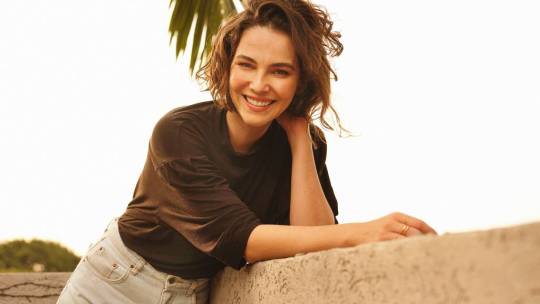#goodmorningveronica
Explore tagged Tumblr posts
Text
Tainá Müller about her real-life heroine: "I want to play women who help other women"

by Renata Maynart | Oct 16th, 2020 | Interview
As the leading actress of "Good Morning, Veronica", she celebrates the possibility of uniting work and personal concerns
While talking to Revista Donna by phone, the actress Tainá Müller made a restrained outburst.
- I was sure that 2020 would be my professional year - she said, referring to the jobs postponed by the pandemic.
But, a few days later, her protagonist in Good Morning, Veronica, a series inspired by the book by Ilana Casoy and Raphael Montes, would confirm her pre-coronavirus foreboding. Netflix's production was among the most watched in Brazil in early October. And she took her name to the center of a debate around a theme that she has already been a spokesperson for on social media: “Brazil is a brutal country to be a woman.”

PHOTO BY GUSTAVO ZYLBERSTAJN
Like a heroine who fails, cries and takes a beating - literally -, the 38-year-old Porto Alegre woman met one of her purposes with the recently launched project, as she likes to say. Graduated in Journalism and pursuing a postgraduate degree in Contemporary Philosophy, Tainá also looked for a way to put her visibility at the service of the search for real solutions to urgent problems. In the second week of social distancing, she started to invite guests on her Instagram profile to talk about topics such as intersectional feminism, indigenous issues, mental health, and the environment, among others. All works are the result of a restlessness that accompanies her in her studies and in her personal relationships - and which should take a new format on YouTube.
Living in São Paulo with her husband, director Henrique Sauer, and her son, Martin, aged four, she returned to the city where she lived since she was modeling, after an eight-year stint in Rio de Janeiro. Also there is a part of her family nucleus, the sisters and presenters Tuti and Titi Müller. A united trio that helped shape another one of her ambitions:
- I want to play women who help other women.
Revista Donna: How was it to join in a project with a theme that touches you personally?
Tainá Müller: The question of women has always touched me, it is a [thing that I] harping on the same string. When I joined this job, I was aligned with this purpose. There are some that are pure entertainment and have their value. But this one got me in the vein. The theme speaks of Brazil, a brutal country to be a woman when we look at the numbers. These are questions that move me a lot, I came from a female environment, it is one of my life's purposes to interpret women who help other women. She is not a tireless heroine, she makes mistakes, but her intention moves me.
RD: And sharing the set with Ilana Casoy, in Good Morning, Veronica?
TM: Ilana is a very interesting woman. I sat down to lunch with her and I lose track of the time [When I talked to her]. Having her and Raphael Montes (authors of the book that originated the series) on the set was essential. They watched the scenes, helped build the character, and They were also very generous. They understood that the Veronica they wrote is a little different from my version. And I am happy that they are happy with this collective construction.
RD: You commented that you think it is strange to see yourself in the rerun of the soap opera Flor do Caribe.
TM: I was in my fourth soap opera, I hadn't even moved to Rio, I lived so much afterwards. When we talk about 2013, we remember that social upheaval, which resulted in all the madness. I changed, but so did the world. It’s somenthing like who blinked, lost it. If you don't change your values, you are left behind.
RD: You are writing a book with Piangers. How's it going?
TM: It was very curious. I wrote an unpretentious text for Globo called Mãe Não Dorme, about that first-time mother thing, in awe in the world in full transformation. The Companhia das Letras called me, but I kept thinking that, to make a book about motherhood, I should have six children (laughs). Then they brought Piangers to create as if it were a dialogue, talking about how our creation was, and what we pass on or not to our children. Also what we want to heal from this relationship. We met more than a year ago, sometimes we recorded the conversations and we are polishing it. The book comes and goes. It is for the beginning of next year at the latest. It's just not ready because of me (laughs).

PHOTO BY GUSTAVO ZYLBERSTAJN
RD: You moved to São Paulo because of your work and soon the pandemic came. How was the adaptation?
TM: It was a big change, because Martin was born in Rio de Janeiro, he was used to the city and his friends. When my husband and I got jobs in the city, I also thought that my sisters were here and that it would be nice to have this base in São Paulo after eight years in Rio. When social distance started, Martin was adapting in the school, it was a blow. . Now we have a pedagogue who comes home to give him a boost, so he doesn't just stay on his cell phone. And finish repairs on the house that we might not have time to do.
RD: When did you realize that it was time to create new projects in this period?
TM: When we stopped, they said it would be for 15 days, but I went to do some research and realized it was going to be a long time. But I confess that I thought I could still go back this year. After the initial fright, the anxiety started to hit, the feeling of finding everything very suffocating, of seeing people in delicate situations, the whole conduct of this crisis. It was then that, in the second week, I started the lives with people who were thinking about alternatives. What we are experiencing is the result of a society that we invented. And everyone knows, even if intimately, that something has not gone right. Somewhere we fail, disconnecting from the environment that gave us life. All of this made me reflect.
RD: How is the choice of the guests?
TM: Djamila Ribeiro was my teacher in intersectional feminism, and I thought this debate was urgent. Thinking about whiteness, don't just post hashtags. It was a subject in which she was very active, she was already active in my life. Coincidentally, protests came to the United States soon after. We artists are a little bit of an antenna of the world, [it’s like] we understand the collective thinking. My studies about indigenous people was also on the agenda. I have been trying for a while to decolonize my thinking by doing postgraduate studies in Contemporary Philosophy. The Western society has done a lot of incredible things, but not because I want to be different or nice, I think we have to look for other ways. Humanity has a very wide range of thinking that cannot be excluded.

PHOTO BY GUSTAVO ZYLBERSTAJN
RD: When did you come up with the idea of thinking about a format for the YouTube lives?
TM: It was really cool to get the people feedback, and Arruda (Mauricio Arruda,director) is my friend and has a research very similar to mine. We decided to organize, make the most edited thing, cute and put it on Youtube. Or, who knows, even thinking about a bigger project, for a platform later on.
RD: You say that your family has always been very loving, but with a macho model. When did you notice this dynamic?
TM: I have always been uncomfortable with this thing in our culture, with men sitting around drinking beer and women doing the dishes. And I didn't understand why. I only had an idea when I got older and, even more, after I had a son, when I realized that my mother raised three children alone, without a nanny. And until then, I had the thought that “my mother didn't work”. When I realized it, a deep respect came, because I really don't know how she got it. I bought this narrative for a long time, today I don’t buy it anymore.
RD: How has Martin's creation been since this awakening?
TM: I am giving him a very different creation. In my culture, I saw a lot of “stop crying, men don't cry”. Obviously, Martin doesn't hear that phrase. I run away from toxic masculinity, I don't want him to be a reactive guy. And it is in everything, from the orientation of what he has to do when he is beaten at school, to his values.
RD: You use the internet a lot to promote your work. How do you perceive the relationship of people with social networks, mainly talking about women?
TM: It is a lot of the timeline that we choose for you. Mine only has a wonderful woman (laughs). But, yes, the vulnerability of people on the social network is very important, it brings less loneliness. I am not interested in those who only sell wealth and perfection. I follow powerful women who are in the struggle, they influence culture in a positive way. The social network brought a lot of light, a lot of democracy, but it also has a lot of shade, a lot of comparison. It is important to think about what each profile arouses you.
This paper is a free translation of Tainá Müller's interview. All rights reserved to Donna magazine.
0 notes
Photo

Bom Dia Verônica || 🇧🇷 #bomdiaveronica #goodmorningVeronica #netflixbrazil #drama #crimedrama #tainamuller #elisavolpatto #camilamorgado #eduardomoscovis https://www.instagram.com/p/CHc7rbbn6d_/?igshid=65rwwxog17bn
#bomdiaveronica#goodmorningveronica#netflixbrazil#drama#crimedrama#tainamuller#elisavolpatto#camilamorgado#eduardomoscovis
0 notes